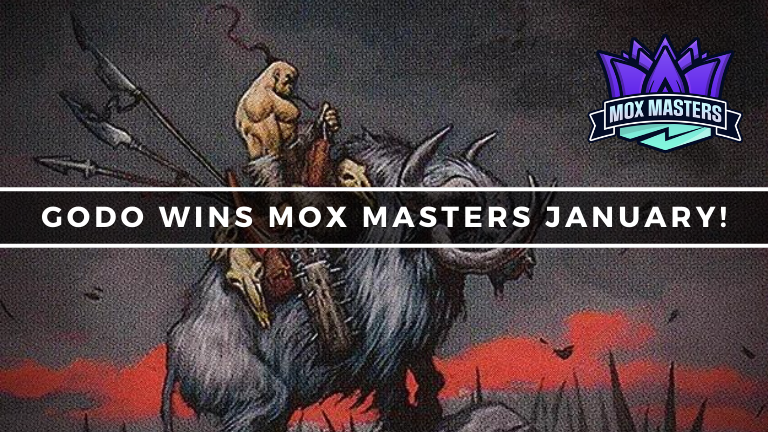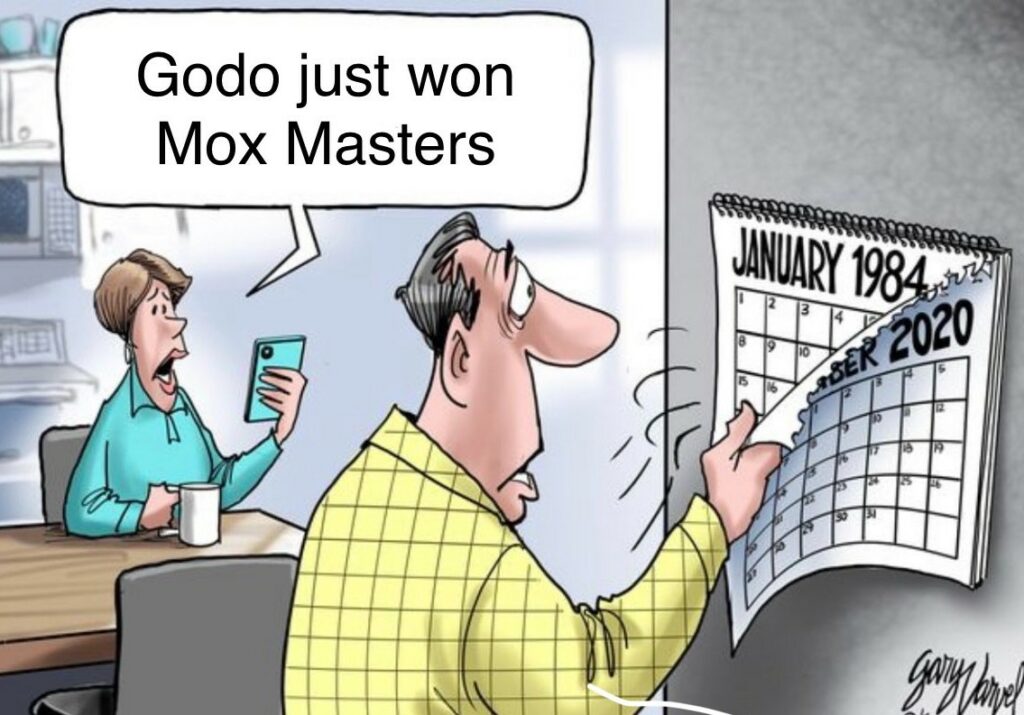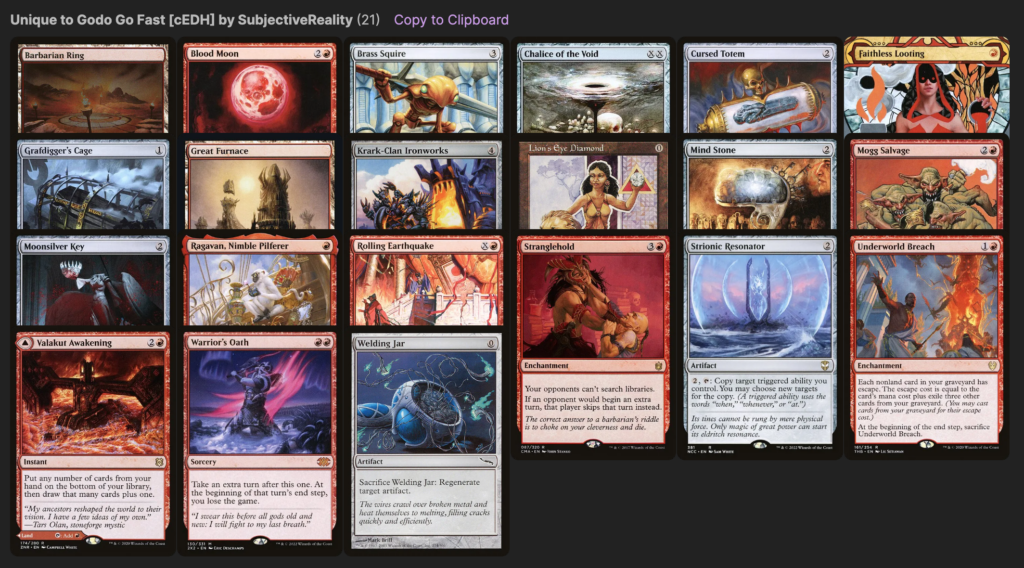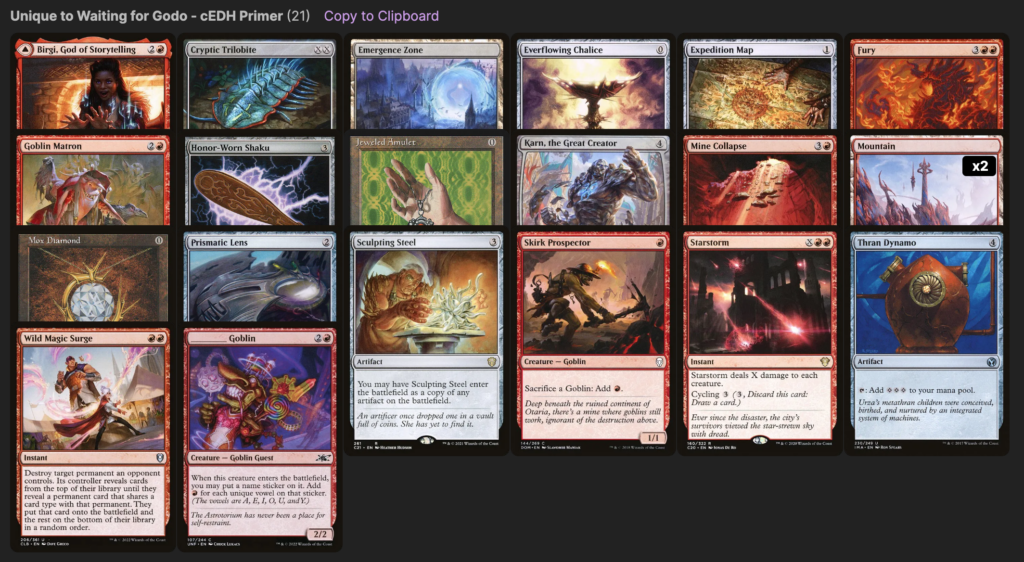Godo Wins Mox Masters January!

Godo, Bandit Warlord | Illustrated by Paolo Parente
Godo Won A Tournament? What Year Is It?
On January 28th, Playing With Power hosted their first Mox Masters event of the year, and the player Subjective Reality took it down with their Godo, Bandit Warlord
But the deck has a very dedicated fanbase and is even the personal weapon of choice for fellow my fellow WP team member, Ryan Street, so the success came with a lot of fanfare, and, as the image below implies, caught a lot of people off guard. Overall, the cEDH community appeared to think Godo couldn't hang with today's cEDH development, adding a lot to the excitement behind the classic's win.

What Changed?
Naturally, the first question you ask yourself when an old classic finds success despite being considered less powerful than the newer decks coming out of the brewer's cauldron is: what changed? On the surface, nothing! What changed is the community's perception over time. Many people find themselves frustrated with how "solved" cEDH is/is becoming thanks to Partner commanders, Underworld Breach
Despite this, we have seen only one of the three Mox Masters events won by Partner commanders and 11 out of the 12 decks in the first 3 final pods have been unique commanders. Having been involved heavily in many competitive formats over my career, I have never seen any format with such deck diversity as cEDH. This diversity is certainly worth considering when assessing the seeming resurgence of Godo, because there is inherent variance in winning decks that comes from the diversity of decks registered. But I think there's more to it than that.
Mono-colored decks have been succeeding for a long time, to the extent that one of the earliest episodes of The Miscast was a theory into why mono-colored decks were winning much more than the Tymna-based Partner decks that were perceived to be the best in the format. A lot of the same theory holds true here today. Coming in with a straightforward, powerful, and resilient gameplan is going to pan out better than a lot of decks looking to play longer games via interaction because the diversity of pods means that each pod will have a completely different texture than the previous one. As a result, interacting less and instead having a more cohesive plan can pay off in a big way, and Godo, Bandit Warlord
Pereception IS Reality
Due to the smaller size and density of cEDH tournaments, meaningful development of decks takes a lot more time than other formats that have tournaments every weekend held on MTGO, at local tournaments, and at very large open-entry-style tournaments, like the 60-card, 1v1 formats do. This means that perception of deck strength in the format is often reality, as some of the best sources of "current" decks are content creators with large reaches and discussions tucked away in various discord servers dedicated to the many different decks in cEDH. The winning Godo decklist, which can be found here or at the bottom of this article, was a full 21 cards different from the decklist featured on the cEDH decklist database!


In 60-card formats, if a deck is 20% different, it's approaching being different enough to be considered a different deck entirely! In fact, MTGO recognizes 75-card decks as "distinct" if the deck is 20 cards different. For context, 20% of a 75-card deck is 15 cards, which makes this difference in builds of Godo only about 6-7 cards off from being considered a completely different deck by current data analysis sensibilities. All of this to say there is quite a lot of exploration being done in the space of Godo and mono-red alone, but if the perception by the community is that Godo is "outdated" or a "glass cannon", people are going to leave a great deal of stones unturned.
As the Janurary Mox Masters proved, creatures are still difficult to answer, and removal does not actually line up well against what is arguably the best card in the Godo deck: Treasonous Ogre
What Now?
Obviously, Godo winning a single tournament is not going to have a dramatic impact on the metagame composition of the February Mox Masters event, and especially not on your local tournaments that you will attend. Maybe a couple people give Godo a try that have access to the deck and were on the fence on what to play, but realistically even that is unlikely. As a whole, cEDH is the slowest adopting format I have ever seen due to the devout loyalty many players have to their decks, commanders, and archetypes, so this month's metagame composition is not going to see a sudden influx of Godo, but this does not mean there are not meaningful adjustments to be made. The players that are dedicated Godo pilots (looking at you, Ryan Street) are going to show up and play the deck almost no matter what and are in prime position to succeed until some deckbuilding adjustments are made. Small adjustments can go a long way here, though. My recommendations are twofold:
- Make sure you know how the Godo deck functions. Know the combo, know the interaction points, and know what they are building towards. It's common to attack players that play black because of Ad Nauseamconsiderations, but consider attacking the Godo player for Treasonous Ogreconsiderations instead if you think the table is lacking on ways to prevent Godo from going off.
2. Play more removal! This has been said many times in the spaces I am a part of, yet creature removal spells consistently seem to be among the first cards cut when it comes to adding new toys and trying new things. Many blue players in my circles have been trying Blue Elemental Blast/Hydroblastfor instance because of the prevalence of Underworld Breach, Dockside Extortionist, Winota, Joiner of Forces, and Kraum, Ludevic's Opus. The blue blasts also happen to be the best card you can possibly put in your deck to beat Godo, Bandit Warlord, so if you find yourself indecisive on the last few interaction spots in your blue deck, give those a try!
Waiting For Godo
The surge of cEDH tournaments has given us more opportunities than ever to learn about cEDH and what the most powerful and consistently successful decks, and players, in the format look like. With that comes a surge of innovation, and it's really cool to see a classic of the cEDH format getting to take part in that innovation and development and succeed on a big stage as a result. If you plan to play cEDH in a tournament of any level, this is a deck you are going to want to be familiar with and consider when selecting your interaction slots for your deck no matter how colorful. Subjective Reality's impressive win not only challenges cEDH competitors to reconsider their understanding of the deck, but also the rest of the metagame! Maybe other cEDH decks are being disrespected simply because people aren't talking about them anymore. Only time will tell. I am confident Boonweaver Giant
This card sucks. Thanks for reading!
Subjective Reality's Godo, Bandit Warlord
View on ArchidektCommander (1)
Sorceries (12)
Artifacts (30)
- 1 Arcane Signet
- 1 Argentum Armor
- 1 Basalt Monolith
- 1 Chalice of the Void
- 1 Chrome Mox
- 1 Conqueror's Flail
- 1 Cursed Mirror
- 1 Cursed Totem
- 1 Defense Grid
- 1 Fellwar Stone
- 1 Grafdigger's Cage
- 1 Grim Monolith
- 1 Hammer of Nazahn
- 1 Helm of the Host
- 1 Jeweled Lotus
- 1 Krark-Clan Ironworks
- 1 Lion's Eye Diamond
- 1 Lotus Petal
- 1 Mana Crypt
- 1 Mana Vault
- 1 Manifold Key
- 1 Mind Stone
- 1 Moonsilver Key
- 1 Mox Opal
- 1 Panharmonicon
- 1 Ruby Medallion
- 1 Sol Ring
- 1 Strionic Resonator
- 1 Trinisphere
- 1 Welding Jar